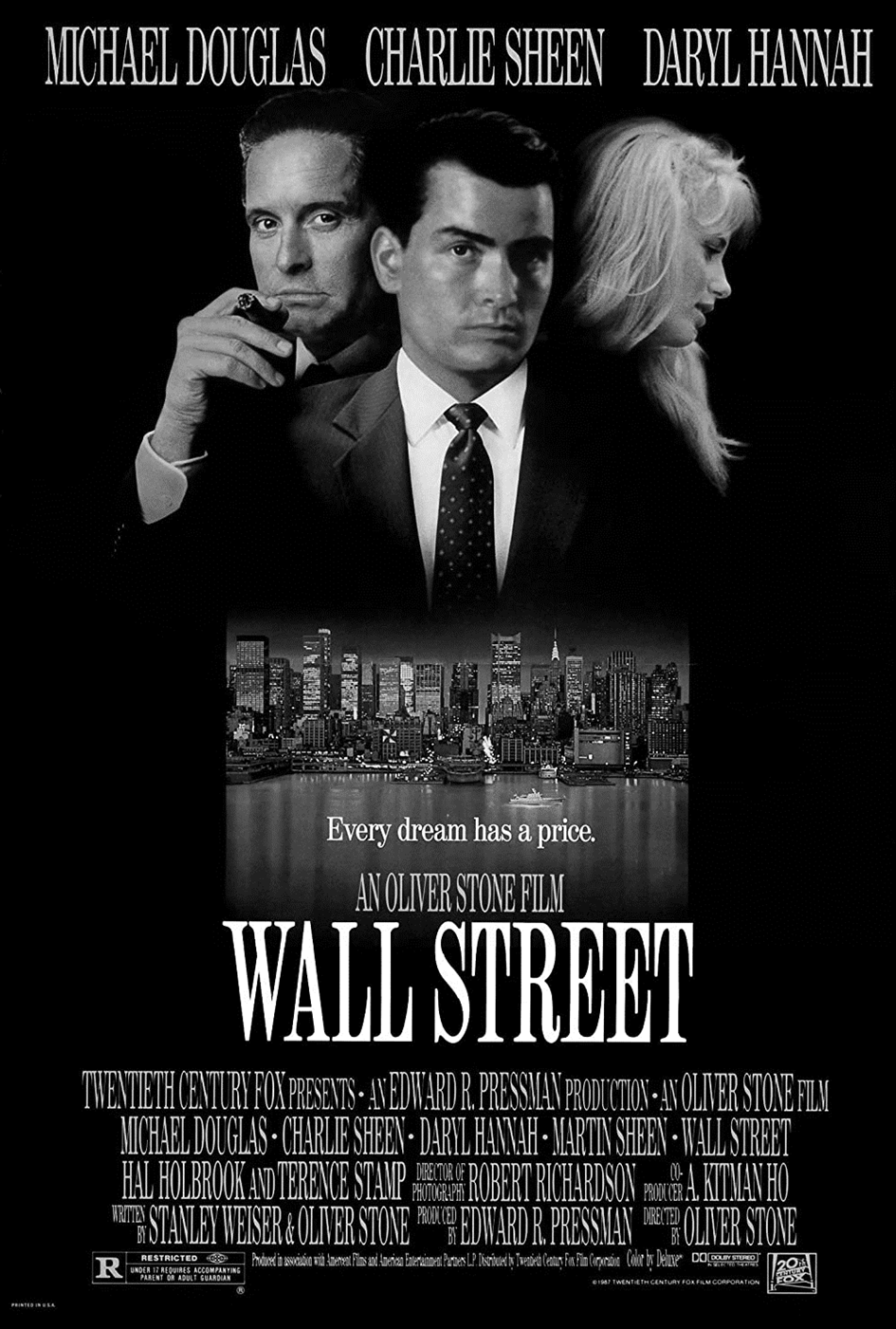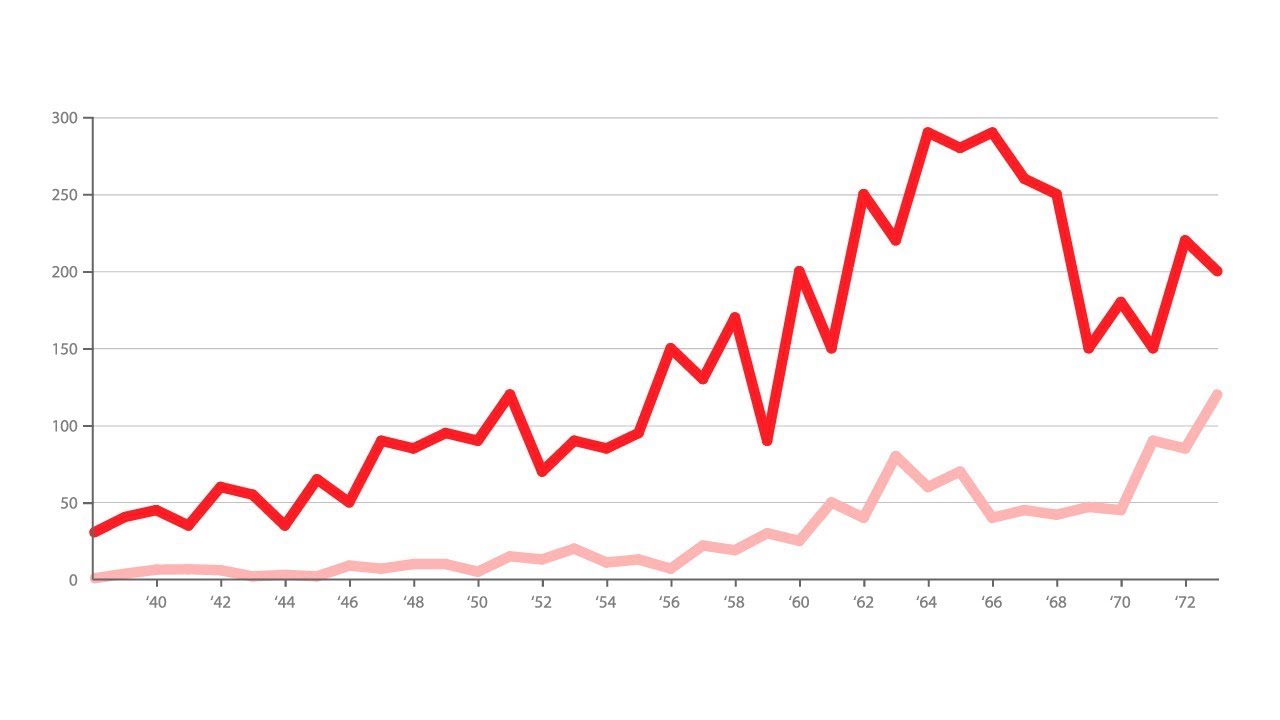WALL STREET, USA, 1987

Wall Street
Movie Review
Summary:
Wall Street is an exciting drama that brings us behind the scenes of the
glamorous world of finance and business during the 80’s. It is a story about a
young and ambitious stockbroker named Bud Fox (Charlie Sheen) who has a big
dream on Wall Street. Therefore, Bud does everything he can to attract the
attention of the notoriously corporate raider Gordon Gekko, who is admired and
feared, especially in the financial district.
In this context, the character of Gordon Gekko is the best example of
ruthless capitalism. The epitome of the ‘80s “greed is good” attitude, the
slicked-back hair, and sharp suits. Gekko eventually notices Bud, who thus
becomes his apprentice. As Gekko mentors Bud, Bud learns all about the world of
big corporate takeovers, insider trading, and wheeling and dealing and his
fortunes soar. He enjoys the extravagant living that success brings, but
success is not without a cost.
But climbing the ladder of success comes with moral dilemmas that Bud
must solve. He is now faced with the decision to maintain loyalty to his
working-class father (Martin Sheen) or to embrace the wealth and power Gekko’s
world represents. The movie is a tense pull between individual principles and
the prospect of incredible wealth.
Director Oliver Stone masterfully captures the excesses of the '80s,
with extravagant parties, luxury cars, and the iconic line, "Greed, for
lack of a better word, is good." The film's pace keeps you engaged
throughout, as you watch Bud's moral compass slowly erode in the face of overwhelming
temptation.
“Wall Street” can be seen as a moral tale of the dangers of unchecked
greed and compromise. It is a captivating drama that takes you into the high
stakes world of finance, and poses serious questions about the cost of success.
In simple terms, Wall Street is a riveting movie, portraying the vibrant
picture of 80s financial growth that is complemented by strong acting and a
compelling narrative. It is a must-watch for anyone interested in finance,
ethics and the eternal fascination with wealth and power.
Criticism about Acting and Story
Realization/Implementation
Acting:
Wall Street was a roller-coaster movie. Michael Douglas as Gordon Gekko,
who plays superbly in the movie. He acts the role of an inflexible corporate
raider so convincingly that you could even love him for his charisma. Douglas
portrays Gekk, who is fascinating; you are bewitched by the slicked back hair,
the power suits, and the immortal phrase: ‘greed is good.’ This earned him an
Oscar.
Bud Fox, however, is a mixed character as played by Charlie Sheen. He
paints the picture of a young and ambitious stockbroker, but there are some
scenes where he is poorly portrayed when compared to Douglas’s Gekko. In some
moments, Sheen’s playing seems to be dull and not engaging enough to keep the
spectator. The chemistry between the two is crucial; at times, it fails to meet
its mark.
Story Realization/Implementation:
Wall Street" effectively depicts the glitz and glamour of the 80’s
financial world but falters when attempting to tell a story. The only
disadvantage might be its predictable plot and somewhat one-dimensional
character morality that might seem too clear for some viewers.
The movie does capture the excitement of the high-stake financial game
pretty well but relies on many clichés. The rise and fall of Bud Fox can follow
a predictable path, and the moral choices he faces are often given away, rather
than being left to the audience’s imagination. The conclusion to the movie
feels very pat, like a wrap up that is too neat and clean, which is not real
life.
Additionally, the film's pacing, while generally engaging, has its
moments of dragging, especially in the middle. Some scenes could have been
trimmed to maintain the overall momentum.
“Wall Street” features an amazing performance from Michael Douglas but
it is less successful in other ways. Charlie Sheen’s acting does not always
match the fervor with which the story is told, while the film’s moralizing
becomes a bit overblown. It offers a riveting insight into the world of finance
but occasionally struggles in storytelling and pacing. Although these
weaknesses, the movie is a must-watch for its description of the “80s of
finance” and its eternal theme of greed.
Rating:
I would award “Wall Street” a four star out of five. It is a lively
portrayal of the ‘80s financial world which, however, has its own shortcomings.
Michael Douglas’ performance as Gordon Gekko is the main strength of the
film. He is an icon of corporate greed, which makes it an unforgettable
character. The portrayal of the extravagant lifestyles and brutal atmosphere of
Wall Street in those times is captivating and horrifying.
But there is a darker side to “Wall Street”. Charlie Sheen’s acting is
decent yet fails to reach the level of Douglas’ high standard. The movie’s
warning of the perils associated with uncontrolled ambition and greed is
hammered home with a sledgehammer, and some audience may find the plot is a bit
too simple and predictable.
Educational Value:
The film ‘Wall Street’ provides educational value and serves as an
example of the possible ethical pitfalls of the corporate world. It provides a
vivid portrayal of the results of unrestrained ambition, and the ethical
compromises that are made while seeking success.
The portrayal of Gordon Gekko as the epitome of corporate greed is among
the most notable insights from the film. The character is a striking example of
what happens when profit is put above all else. The movie prompts the audience
to think about the moral problems that may rise up in the finance and business
world, and to discuss issues about ethics in the office.
Finally, while “Wall Street” may have some shortcomings, its learning
potential is undeniably great. It triggers debates about the moral compass of
the financial industry and invites the viewers to think about the decisions
that they make in their own professional life. A remarkable feature of this
film is its ability to make a lasting impression and cause reflection upon the
film’s end.
Legacy and Relevance:
"Wall Street" isn't just a movie; it's a piece of cultural
history that's still talked about today. It shows us what the flashy 1980s were
like, with big money and corporate greed taking center stage. The character
Gordon Gekko, played by Michael Douglas, became a symbol of that greed,
famously saying, "Greed is good." The film has had a big influence on
other movies and TV shows about finance and business. But what makes it truly
special is that its themes, like the choices we make for money and ethics, still
matter now. With real-world financial crises and scandals, the movie's message
hits close to home. It keeps sparking discussions about money, morals, and
ambition in our lives and the world around us.



